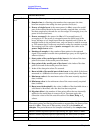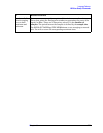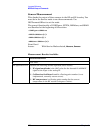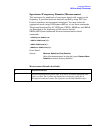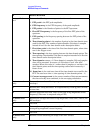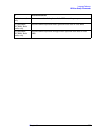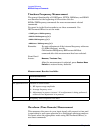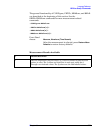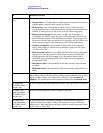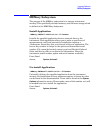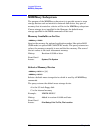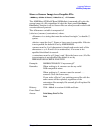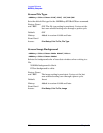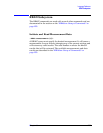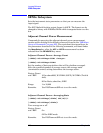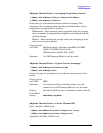
280 Chapter 5
Language Reference
MEASure Group of Commands
not specified or
n=1
Returns the following comma-separated scalar results:
1. Sample time is a floating point number representing the time between
samples when using the trace queries (n=0,2,etc).
2. Mean power is the mean power (in dBm). This is either the power
across the entire trace, or the power between markers if the markers are
enabled. If averaging is on, the power is for the latest acquisition.
3. Mean power averaged is the power (in dBm) for N averages, if
averaging is on. This is either the power across the entire trace, or the
power between markers if the markers are enabled. If averaging is on,
the power is for the latest acquisition. If averaging is off, the value of the
mean power averaged is the same as the value of the mean power.
4. Number of samples is the number of data points in the captured
signal. This number is useful when performing a query on the signal
(i.e. when n=0,2,etc.).
5. Peak-to-mean ratio has units of dB. This is the ratio of the maximum
signal level to the mean power. Valid values are only obtained with
averaging turned off. If averaging is on, the peak-to-mean ratio is
calculated using the highest peak value, rather than the displayed
average peak value.
6. Maximum value is the maximum of the most recently acquired data
(in dBm).
7. Minimum value is the minimum of the most recently acquired data (in
dBm).
2 Returns comma-separated trace points of the entire captured trace data.
These data points are floating point numbers representing the power of the
signal (in dBm). There are N data points, where N is the number of
samples. The period between the samples is defined by the sample time.
3, cdma2000,
W-CDMA, Basic
modes only
Returns comma-separated magnitude values of the time data in Volts peak.
4, Option B7C
with cdma2000,
W-CDMA, Basic
modes only
Returns comma-separated values of phase in degrees.
5, Option B7C
with cdma2000,
W-CDMA, Basic
modes only
In input modes other than Ionly and Qonly returns comma-separated
values of I and Q trace data in Volts. The values are in pairs with the I
value first. In Ionly and Qonly the data retured is comma-separated values
of the I data or the Q data.
n Results Returned



